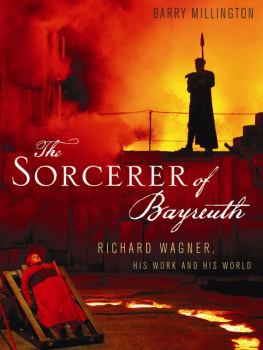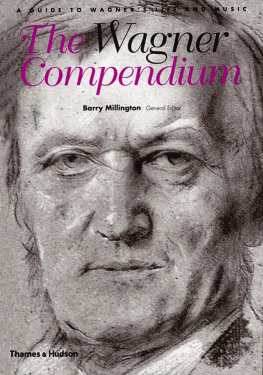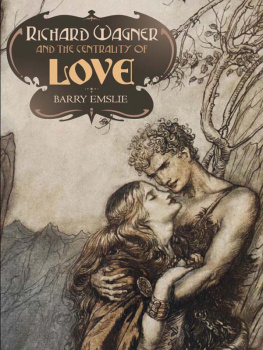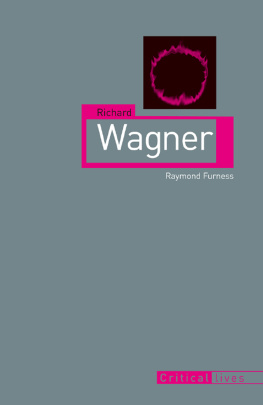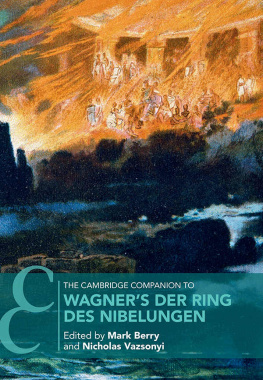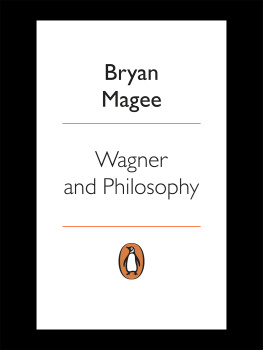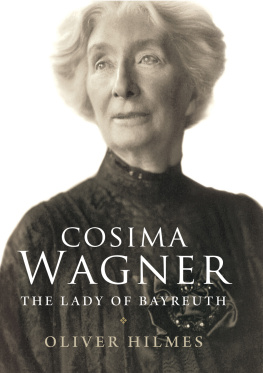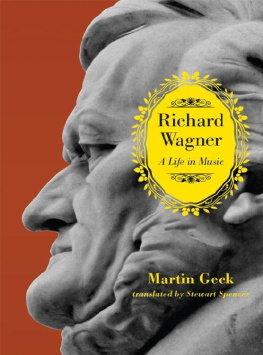1813
22 MAY Birth in Leipzig, in house known as the Red and White Lion in the Brhl. His putative father, Carl Friedrich Wagner, is a municipal official.
JUL.AUG. His mother, Johanna, embarks on trip through war-torn territory from Leipzig to Teplitz, where she stays with family friend Ludwig Geyer, an actor and painter.
16 AUG. Baptised in the Thomaskirche, Leipzig.
23 NOV. Carl Friedrich dies.
1814
28 AUG. Johanna and Geyer marry.
1820
Looked after by Pastor Christian Wetzel at Possendorf, near Dresden, where he has piano lessons.
1821
30 SEP. Geyer dies.
1822
2 DEC. Enters Dresden Kreuzschule as Richard Geyer.
1826
DEC. Stays in Dresden with the family of schoolfriends when his own family relocates to Prague.
1827
Visits inspirational Uncle Adolf in Leipzig, then rejoins own family now back in that city.
1828
21 JAN. Enters Nicolaischule in Leipzig as Richard Wagner.
SPRING/SUMMER Completes grisly tragedy called Leubald and studies J. B. Logiers Thorough-Bass.
AUTUMN Harmony lessons with Christian Gottlieb Mller.
1829
First compositions: two piano sonatas and string quartet (all lost).
1830
EASTER Leaves Nicolaischule.
16 JUN. Enrols at Thomasschule, Leipzig.
SUMMERDEC Studies violin briefly and writes four overtures (all lost).
1831
EARLY 1831 Composes Seven Pieces for Goethes Faust (voice and piano) and Piano Sonata in B flat for Four Hands.
23 FEB. Matriculates at Leipzig University.
AUTUMN Studies with Christian Theodor Weinlig; writes Piano Sonata in B flat (op. 1) and Fantasia, also for piano.
1832
EARLY 1832 Composes Grosse Sonate in A major.
APR.JUN. Composes Symphony in C major
SEP.OCT. Brief infatuation with daughter of Count Pachta, on whose estate at Pravonin, near Prague, he stays. Begins to sketch opera, Die Hochzeit (later abandoned).
1833
JAN./FEB. Joins brother Albert in Wrzburg, taking post as chorus master at theatre. Text for Die Feen (music completed 6 Jan. 1834). Brief fling with soprano Therese Ringelmann.
1834
21 JAN. Returns to Leipzig, where he encounters Young Germany.
END JUL. Becomes musical director of Heinrich Bethmanns travelling company based in Magdeburg.
SUMMER Falls in love with actress Minna Planer; conducts Don Giovanni.
1835
JAN. Begins Das Liebesverbot.
1836
29 MAR. Premiere of Das Liebesverbot in Magdeburg.
APR. Bankruptcy of Bethmann company.
24 NOV. Marries Minna in Knigsberg-Tragheim.
1837
MAR. Composes Rule Britannia Overture.
1 APR. Appointed musical director at Knigsberg Theatre.
MAYJUL. Minna leaves him; he pursues her and they stay at Blasewitz, near Dresden, where he reads Bulwer-Lyttons novel Rienzi, on which subject he sketches an opera.
JUN. Appointed musical director at theatre in Riga.
1838
SUMMER Begins Singspiel Mnnerlist grsser als Frauenlist, but abandons after completing only two numbers.
AUG. Completes poem of Rienzi and begins music.
1839
JUN.JUL. Burdened with debts and now unemployed, he leaves Riga clandestinely with Minna. Minna suffers miscarriage. Turbulent crossing to London (arrives 12 Aug.).
AUG.SEP. Continues to France, eventually arriving in Paris.
24 NOV. Premiere of Berliozs Romo et Juliette makes deep impression.
DEC. Begins what is to become Faust Symphony.
1840
6 MAY Sends prose sketch of Der fliegende Hollnder to Scribe and (Jun.) to Meyerbeer.
MAYJUL. Begins music of Hollnder.
OCT./NOV. Narrowly escapes debtors gaol.
19 NOV. Completes Rienzi.
1841
1828 MAY Writes poem of Hollnder.
NOV. Completes score of Hollnder.
1842
7 APR. Leaves Paris with Minna and heads for Dresden.
JUN.JUL. Summer holiday in Teplitz, where he makes prose draft of Tannhuser.
20 OCT. Premiere of Rienzi in Dresden under Reissiger is resounding success.
1843
2 JAN. Premiere of Der fliegende Hollnder under Wagners own baton virtually assures him of job offer of Kapellmeister at king of Saxonys court.
2 FEB. Accepts job, after some hesitation.
APR. Completes poem of Tannhuser.
6 JUL. Conducts gala performance, with some 1,200 singers, of new choral work Das Liebesmahl der Apostel in Dresden Frauenkirche.
1 OCT. Moves to more spacious apartment in the Ostra-Allee, where he begins to assemble an impressive library of ancient and contemporary material.
1844
1415 DEC. His Trauermusik played at ceremony for transferral of Webers remains from London to Dresden, followed by delivery of oration at graveside.
1845
13 APR. Completes score of Tannhuser.
3 JUL. Visits Marienbad with Minna, dog and parrot to take waters; immerses himself simultaneously in Parzivl and Lohengrin legends.
16 JUL. Prose draft for Die Meistersinger completed.
3 AUG. Prose draft for Lohengrin completed.
19 OCT. Premiere of Tannhuser in Dresden.
1846
2 MAR. Submits report about reorganization of royal orchestra.
5 APR. Performance of Beethovens Ninth Symphony at traditional Palm Sunday concert under his baton is a triumph in both musical and public-relations terms.
30 JUL. Finishes first complete draft of Lohengrin.
OCT. Prose sketch for five-act work (probably an opera) on legend of Friedrich Barbarossa.
1847
24 FEB. Conducts own version of Glucks Iphignie en Aulide.
29 AUG. Finishes second complete draft of Lohengrin.
(1847) Reads several Greek plays in translation, including Oresteia trilogy.
1848
9 JAN. Death of mother in Leipzig.
FEB. Uprising in Paris.
MAR. Uprising in Vienna, greeted enthusiastically by Wagner.
28 APR. Completes score of Lohengrin.
MAY Submits radical Plan for the Organization of a German National Theatre for the Kingdom of Saxony, which oddly fails to find favour with his superiors.
14 JUN. Delivers address to republican Vaterlandsverein. Around this time meets Russian anarchist Bakunin.
4 OCT. Prose rsum for Ring, called Der Nibelungen-Mythus.
AUTUMN Above rsum turned into libretto, called Siegfrieds Tod.
1849
JAN.APR. Scenario for five-act drama (probably opera): Jesus von Nazareth.
APR.MAY Active in revolutionary struggle, narrowly escaping arrest; flees to Switzerland and thence Paris.
JUL. Settles down in Zurich; writes Art and Revolution.
4 NOV. Completes The Artwork of the Future.
DEC. Begins prose draft for opera Wieland der Schmied (not completed).
1850
JAN. Annual allowance of 3,000 francs proposed by Julie Ritter and Jessie Laussot.
MAR.MAY Affair with Laussot in Bordeaux, but subsequent elopement to Greece or Asia Minor thwarted by her husband.
3 JUL. Returns to Zurich and Minna.
SUMMER Musical sketches for Siegfrieds Tod (later Gtterdmmerung).
28 AUG. Premiere of Lohengrin in Weimar under Liszt.
SEP. Publishes Jewishness in Music.
WINTER Writes Opera and Drama (completed 10 Jan. 1851).
1851
MAY Sketches Der junge Siegfried (later Siegfried), then writes poem (Jun.).
JUL.AUG. Writes A Communication to my Friends.
15 SEP. Begins rigorous regimen at the Albisbrunn hydropathic establishment, in the hope of alleviating erysipelas and constipation.
Next page
